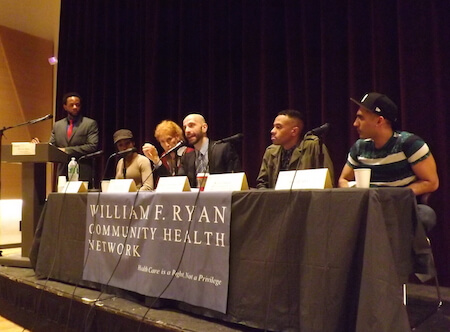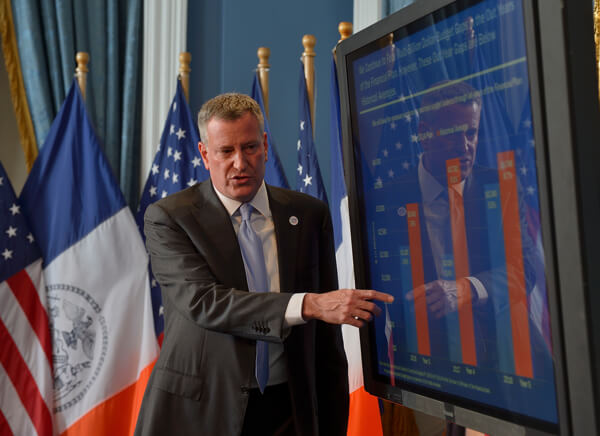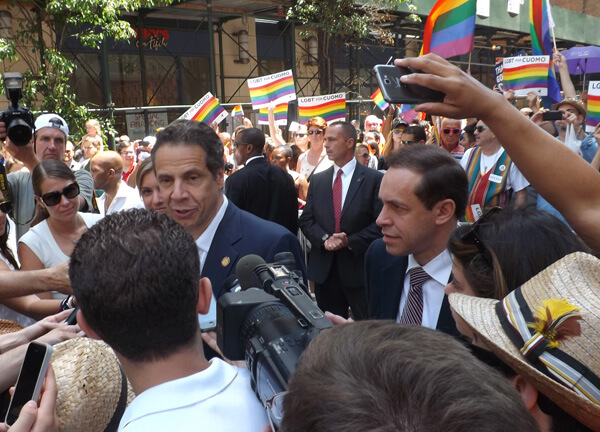The city health department's Dr. Demetre Daskalakis, a task force member, with Dr. Barry S. Zingman, the medical director of the AIDS Center at Montefiore Medical Center, discuss PrEP at a January 12 press event. | GAY CITY NEWS
The task force charged with creating the plan for ending the AIDS epidemic in New York delivered its recommendations to the Cuomo administration on January 13, even as initiatives that are part of that plan continue to be launched.
“Things are being rolled out even before our recommendations are published,” said Charles King, chief executive officer at Housing Works, an AIDS group, and the co-chair of the 63-member task force that drafted the plan.
In June of last year, Governor Andrew Cuomo endorsed the plan aimed at reducing new HIV infections in New York from the current roughly 3,000 annually to 750 a year by 2020. The task force included senior staff from the state and New York City health departments, academics, and advocates from social services, LGBT, and AIDS groups across the state.
January 21 budget address will be first sign of how administration in Albany views advocates’ input
Altogether, the task force made “48 or so” recommendations, King said. They include proposals for expanding public benefits, housing, and healthcare for people with HIV, using anti-HIV drugs to prevent people from becoming infected, and improving the use of data and monitoring to measure the success of the plan.
“If our whole program is implemented, what we’re saying is we go beyond what the governor has called for,” said King, who added that the proposals would lead to zero new HIV infections, no deaths from AIDS, and an end to discrimination against people with HIV by 2020. “We decided fairly early in the process that we were going to go beyond the stated goal.”
The AIDS Institute, which is part of the state health department, will finalize the recommendations, but advocates will have an indication if their proposals have been endorsed when Cuomo issues his proposed budget for the state fiscal year beginning April 1, which he will present in a speech to the Legislature on January 21.
“I think there are things we’re probably going to have to fight for,” King said. “The community is prepared for that.”
Groups have been careful about discussing the plan’s cost because that can be hard to accurately estimate and they see no value in creating controversy prior to seeing Cuomo’s proposed budget. With a nod toward the high cost of implementing a plan to end AIDS, the Cuomo administration’s first action was to negotiate lower prices with drug manufacturers for the anti-HIV medications that are a central component of the effort.
“The committee is working on its version of trying to cost things out and I know the AIDS Institute is working on its version of trying to cost things out,” King said.
Some elements of the plan, which include both HIV prevention interventions and more access generally for more people to healthcare, have already begun or are already completed.
Last year, the Cuomo administration and Mayor Bill de Blasio enacted a rent cap for people with AIDS who live in publicly subsidized housing that meant their rent could not exceed 30 percent of their income. The rent cap alone will cost the city nearly $22 million in the current and prior fiscal years. Some data supports the view that stable housing allows people with HIV to adhere to their medication schedule, which makes them far less infectious to others.
There was strong support on the task force for broadening available housing support to those who are HIV-positive but do not have an AIDS diagnosis, an idea New York City has previously resisted.
In December, the Cuomo administration issued regulations requiring that private insurers operating in New York as well as Medicaid, the government-run health plan for the poor, cover medically necessary healthcare for transgender people who are transitioning from one gender to the other. Transgender healthcare access was a key concern of the task force. The state estimated that would cost $6.7 million annually.
On January 15, State Senator Gustavo Rivera, who represents part of the Bronx, and Assemblymember Dick Gottfried, who represents part of Manhattan, discussed a legislative proposal they are preparing that would completely decriminalize syringe possession and lift restrictions on their sale in pharmacies. The distribution of clean needles to drug injectors, among other interventions, in New York City has reduced new HIV diagnoses among that group from thousands annually to 89 in 2013.
On January 12, the city health department launched a program to send staff into roughly 600 clinics and doctors’ offices to educate them about pre-exposure prophylaxis (PrEP) and post-exposure prophylaxis (PEP). Both interventions use anti-HIV drugs to prevent people from becoming infected and they are major elements of the plan.
“The truth right now is that with all of the work we’re doing promoting PEP and PrEP to the community, we’re seeing more people are aware of it and slowly we’re seeing an increase in the uptake of these interventions,” said Dr. Demetre Daskalakis, a task force member who is the assistant commissioner in the Bureau of HIV Prevention & Control at the city health department.
Just as the task force members have been careful about discussing costs, they have also avoided laying out benchmarks and interim goals between now and getting to 750 or fewer new HIV infections annually by 2020. Advocates and government officials are certainly thinking about how to evaluate the plan’s progress and they have discussed this among themselves.
“We’re working with our high risk behavioral survey to actually generate a surveillance tool to let us know what’s happening with PrEP in the city,” Daskalakis said at a press event this week at the Oval Center, an AIDS clinic at Montefiore Medical Center in the Bronx. “Our hope is we will be able to actually have a survey that is really representative of the community.”
King told Gay City News that among the recommendations was one to create a subcommittee of the state AIDS Advisory Council that will be responsible for creating performance measures for the plan and monitoring those measures. Other recommendations call for using and improving data gathering in existing state programs, such as Medicaid, to monitor the plan’s progress.
“I think over the last year we’ve already made significant strides and we’re going to make significant strides this year, but it’s not all going to happen in one fell swoop,” King said.


































